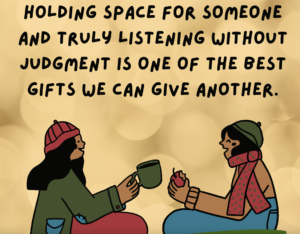What is to hold space for someone?
Holding space for someone simply means being present for them without judgment. It means allowing someone the time and freedom to feel, process and work through their emotions and experiences in their own way so they can heal.
When you hold space for someone, you listen openly and actively, offer empathy and understanding. You provide a safe container for them to be vulnerable.
You give them the freedom to feel, think, and be exactly who they are in that moment. You listen openly and deeply, without trying to fix them, change them, or give advice unless they ask for it.
Your role is simply to bear witness and provide comfort through your nonverbal and verbal responses that convey care, acceptance, and compassion.
This can help the other person feel truly seen, heard, understood and eventually heal. This allows them to process and work through difficult emotions, thoughts, and experiences that they may have been holding inside.
Simply knowing someone is there to listen and support them, without an agenda, can provide relief and validation.
Over time, holding space can help the other person gain clarity, insights, and healing that comes from being able to express themselves fully and authentically.
In short, holding space for another human being involves creating a safe container where they feel free to be vulnerable without being criticized or gaslighted.
You listen with an open heart and offer unconditional positive regard, which can be incredibly powerful and transformative for the other person
In practical terms, holding space for someone can look like:
• Simply being there and listening without interrupting. Letting the other person take the lead in sharing what they need to.
• Avoiding the urge to fix, solve or give advice unless asked.  Letting go of the need to problem-solve and just focusing on being present.
Letting go of the need to problem-solve and just focusing on being present.
• Offering empathy by reflecting back what you’re hearing and seeing. Saying things like that sounds difficult or I can imagine that was hard.
• Asking open-ended questions to understand better but avoiding interrogating the person. Questions like what was that experience like for you?
• Not allowing the person’s sharing to activate your own triggers, stories or judgments. Staying grounded in the present moment with them.
• Resisting the urge to divert the conversation to yourself or your own experiences. Keeping the focus on the other person and what they need in that moment.
Essentially, when you hold space for someone, you create a safe container by being fully present and allowing them to feel, process and move through their emotions without trying to change or fix them. You offer the gift of your time, listening and empathy.
Leave a Reply